Indoor Air Quality
Americans spend a lot of time indoors: in our houses, at work and in school. It is just as important to care about the quality of our air while indoors as it is when we are outside.
According to the U.S Environmental Protection Agency (EPA), a growing body of scientific evidence has indicated that the air within homes and other buildings can be more seriously polluted than the outdoor air in even the largest and most industrialized cities. There is a wide variety of indoor air pollutants and an even larger variety of sources for these pollutants.
Top Indoor Air Quality Concerns: Radon , Mold, VOC's: Paints, Cleaners and Solvents
Suggestions for Improving Your Indoor Air
- Properly ventilate your home. Increase the amount of fresh air by opening windows and doors or running air conditioners and fans that exhaust to the outdoors.
- Change heating and air conditioner filters regularly. Follow manufacturer recommendations.
- Adjust humidity. The EPA recommends a humidity level of between 30-50%. Too much humidity could potentially lead to mold.
- Learn about potential indoor air pollutants and how to combat them by exploring this website.
The EPA has a number of publications and informational resources on their Indoor Air Website.
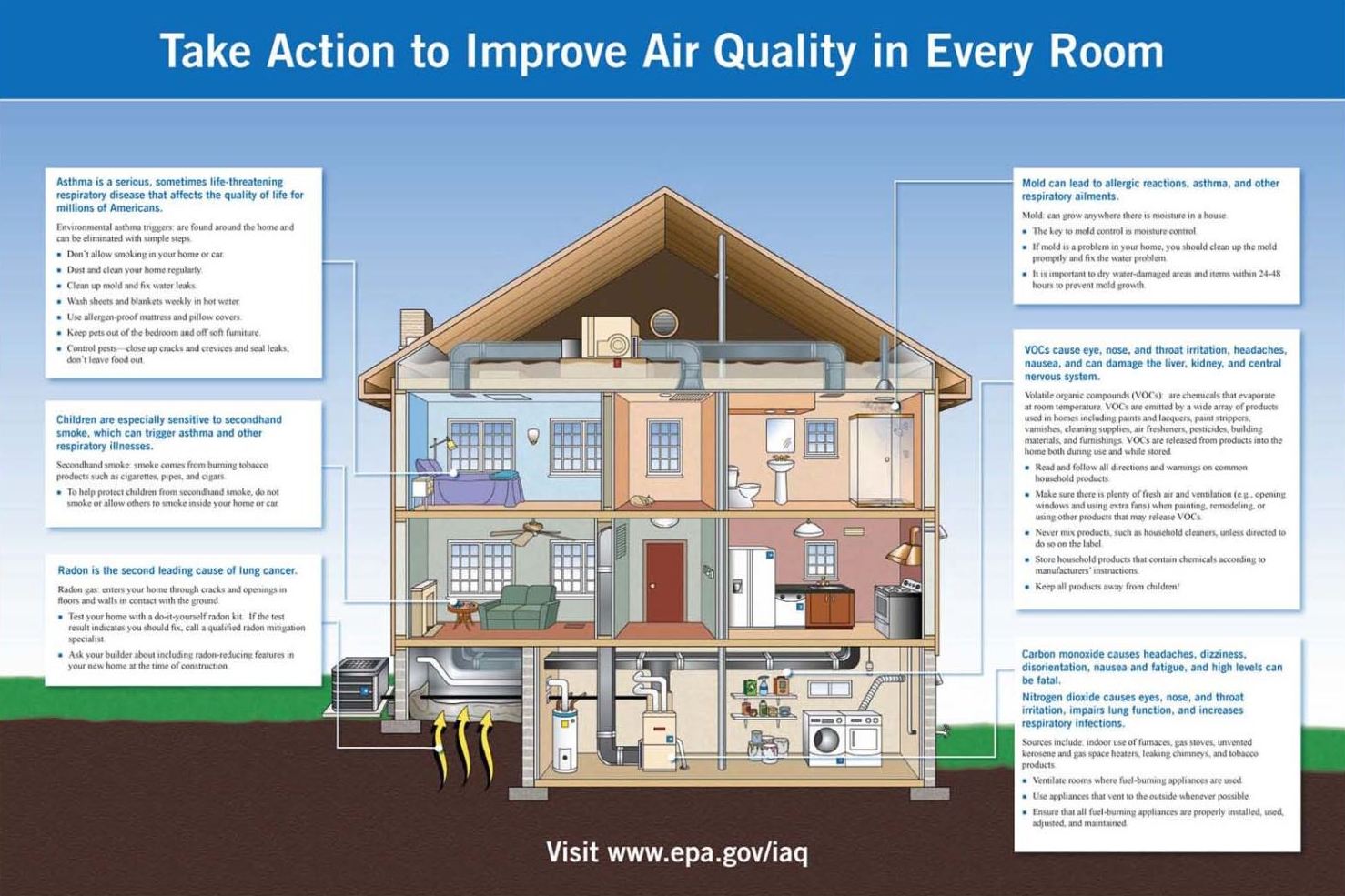
Other Air Quality Issues
Asbestos
Asbestos is a mineral fiber once commonly used in a variety of products due to its insulating and fire-retardant properties. It was used in a wide range of manufactured goods, including:
- building materials (roofing shingles, ceiling and floor tiles, paper products, and asbestos cement products)
- friction products (automobile clutch, brake, and transmission parts)
- heat-resistant fabrics, packaging, gaskets, and coatings.
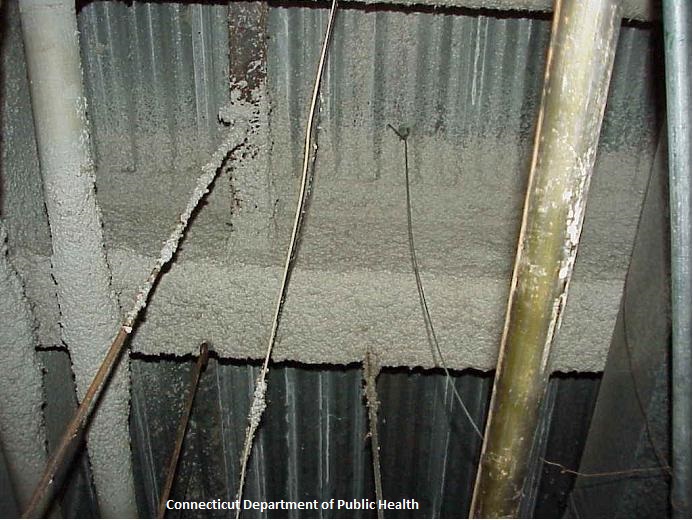
Asbestos may be found in one of two forms: friable or non-friable.
- Friable asbestos can be crumbled, pulverized or powdered by hand pressure. Friable asbestos presents an inhalation risk because asbestos fibers are more easily released into the air. Examples of friable asbestos include sprayed fireproofing on structural steelwork or thermal insulation on pipes.
- Non-friable asbestos products are those where the fibers are bound or locked into the product, so that the fibers are not readily released.
Examples of non-friable asbestos products include vinyl asbestos floor tiles, acoustic ceiling tiles, and asbestos cement products. These products present a risk only when they are handled in a way that creates dust containing asbestos fibers which can be inhaled. When asbestos-containing materials are damaged or disturbed by repair, remodeling, or demolition activities, microscopic fibers can become airborne if proper controls are not in place. This can result in the potential for significant health problems.
Potential Sources of Asbestos
According to information from the U.S. Consumer Product Safety Commission (CPSC), the few products currently made which still contain asbestos that could be inhaled are required to be labeled as such. However, until the 1970s, many types of building products and insulation materials used in homes contained asbestos.
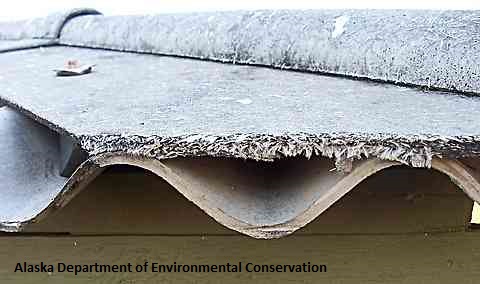
Examples of these products include:
- Roofing and siding shingles made of asbestos cement
- Insulation in some houses built between 1930 and 1950
- Some textured paint and in patching compounds used on wall and ceiling joints (their use was banned in 1977)
- Some vinyl floor tiles and the backing on vinyl sheet flooring and adhesives
- Hot water and steam pipes in older houses may be coated with an asbestos material or covered with an asbestos blanket or tape
The CSPC website entitled Asbestos in the Home provides more information on potential sources of asbestos in building materials and other products.
Health Effects of Asbestos Exposure
Exposure to airborne asbestos may result in a potential health risk due to the inhalation of asbestos fibers. Fibers embedded in lung tissue over time may cause serious lung diseases including asbestosis, lung cancer, or mesothelioma. Smoking increases the risk of developing illness from asbestos exposure.
If you are concerned about possible exposure to friable asbestos, consult a physician who specializes in lung diseases (pulmonologist).
Three of the major health effects associated with asbestos exposure include:
- Asbestosis - Asbestosis is a serious, progressive, long-term non-cancerous disease of the lungs. It is caused by inhaling asbestos fibers that irritate lung tissues and cause the tissues to scar. The scarring makes it hard for oxygen to get into the blood. Symptoms of asbestosis include shortness of breath and a dry, crackling sound in the lungs while inhaling. There is no effective treatment for asbestosis.
- Lung Cancer - Lung cancer causes the largest number of deaths related to asbestos exposure. People who work in the mining, milling, manufacturing of asbestos, and those who use asbestos and its products are more likely to develop lung cancer than the general population. The most common symptoms of lung cancer are coughing and a change in breathing. Other symptoms include shortness of breath, persistent chest pains, hoarseness, and anemia.
- Mesothelioma - Mesothelioma is a rare form of cancer that is found in the thin lining (membrane) of the lung, chest, abdomen, and heart and almost all cases are linked to exposure to asbestos. This disease may not show up until many years after asbestos exposure. This is why great efforts are being made to prevent school children from being exposed.
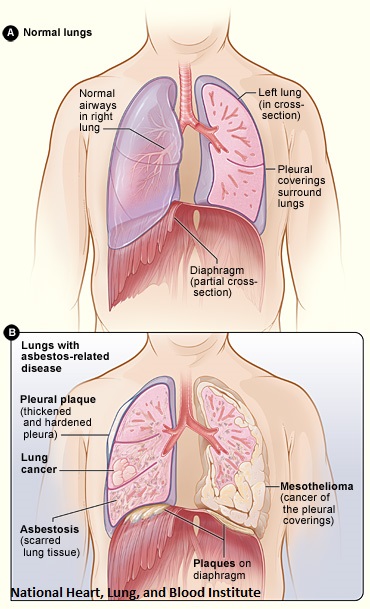
Managing Asbestos in Your Home
According to the U.S. Consumer Product Safety Commission, you can't tell whether a material contains asbestos simply by looking at it, unless it is labeled. If in doubt, treat the material as if it contains asbestos or have it sampled and analyzed by a qualified professional.
A professional should take samples for analysis, since a professional knows what to look for, and because there may be an increased health risk if fibers are released. In fact, if done incorrectly, sampling can be more hazardous than leaving the material alone.
What if I Disturb Asbestos?
The best thing to do is to leave asbestos-containing material that is in good condition alone.
Before you have your house remodeled, you should find out whether asbestos-containing materials are present. If asbestos-containing materials become damaged (i.e., unraveling, frayed, breaking apart), you should immediately isolate the area (keep pets and children away from the area) and refrain from disturbing the material (either by touching it or walking on it).
You should then immediately contact an asbestos professional for consultation. It is best to receive an assessment from one firm and any needed abatement from another firm to avoid any conflict of interest.
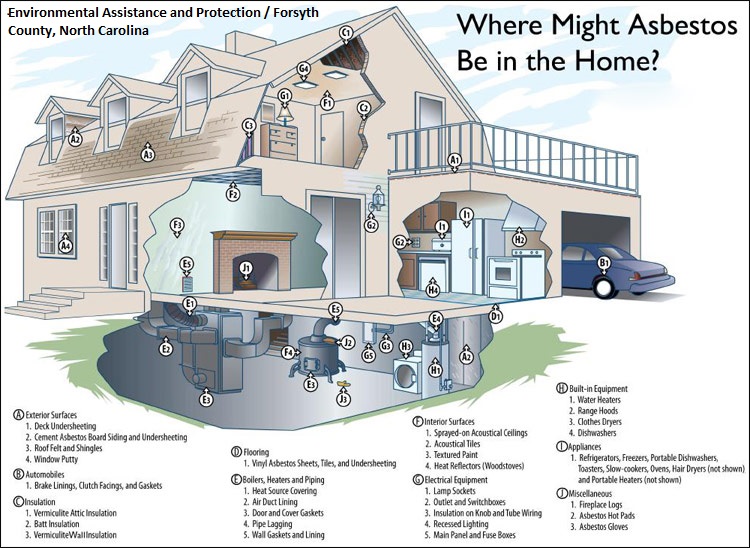
To download, click (PDF, 161 KB)
Asbestos Do's And Don'ts for the Homeowner
✔ Do keep activities to a minimum in any areas having damaged material that may contain asbestos.
✔ Do take every precaution to avoid damaging asbestos material.
✔ Do have removal and major repair done by people trained and qualified in handling asbestos. It is highly recommended that sampling and minor repair also be done by asbestos professionals.
✘ Don't dust, sweep, or vacuum debris that may contain asbestos.
✘ Don't saw, sand, scrape, or drill holes in asbestos materials.
✘ Don't use abrasive pads or brushes on power strippers to strip wax from asbestos flooring.
✘ Don't sand or try to level asbestos flooring or its backing. When asbestos flooring needs replacing, install new floor covering over it, if possible.
✘ Don't track material that could contain asbestos through the house. If you cannot avoid walking through the area, have it cleaned with a wet mop. If the material is from a damaged area, or if a large area must be cleaned, call an asbestos professional.
Finding a Licensed Asbestos Contractor
Asbestos professionals are trained in handling asbestos material. The type of professional will depend on the type of product and what needs to be done to correct the problem. You may hire a general asbestos contractor or, in some cases, a professional trained to handle specific products containing asbestos.
Asbestos professionals can conduct home inspections, take samples of suspected material, assess its condition, and advise about what corrections are needed and who is qualified to make these corrections. Once again, material in good condition need not be sampled unless it is likely to be disturbed.
Some firms offer combinations of testing, assessment, and correction. A professional hired to assess the need for corrective action should not be connected with an asbestos-correction firm. It is better to use two different firms so there is no conflict of interest.
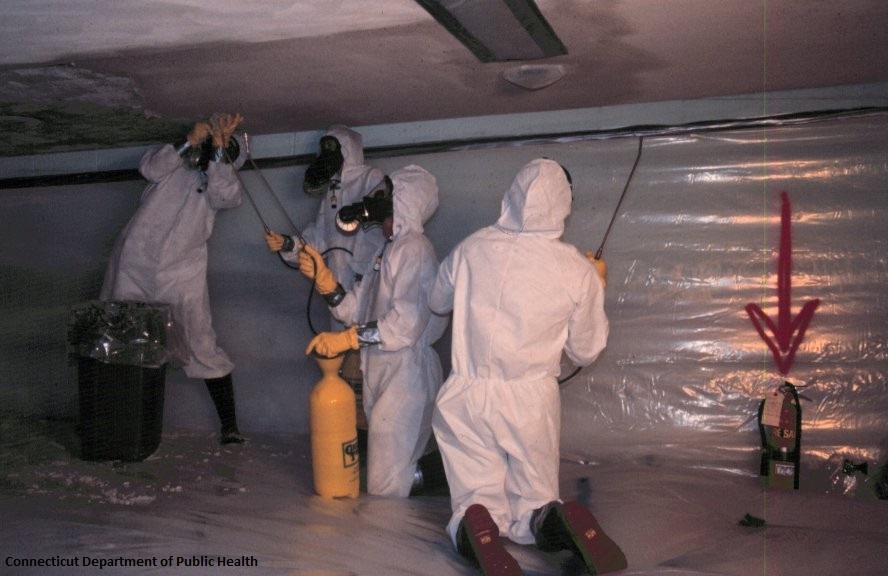
Finding a Contractor
Companies that remove, repair, or encapsulate asbestos-containing materials in Maryland must be licensed by the Maryland Department of the Environment (MDE). A license is valid for one year and must be renewed annually. A list of licensed asbestos contractors (2018 edition) can be found on the MDE website.
In addition, MDE maintains a list of companies that provide air quality testing, including testing for the presence of asbestos. The companies on this list are not required to be licensed, so consumers should request information regarding the credentials, training, and experience provided by a company they may retain.
Before hiring a professional, ask for references from previous clients. Find out if they were satisfied. Ask whether the professional has handled similar situations. Get cost estimates from several professionals, as the charges for these services can vary.
In addition to general asbestos contractors, you may select a roofing, flooring, or plumbing contractor trained to handle asbestos when it is necessary to remove and replace roofing, flooring, siding, or asbestos-cement pipe that is part of a water system. Normally, roofing and flooring contractors are exempt from state and local licensing requirements because they do not perform any other asbestos-correction work.
Asbestos Regulations
Asbestos remediation activities in Maryland are regulated by the Maryland Department of the Environment (MDE). Their primary focus is asbestos in friable form. Friable asbestos must be removed from any building prior to renovation or demolition activities with the potential to release asbestos into the air. This removal must be performed by an asbestos professional licensed by MDE.
Information on MDE’s asbestos program can be found at the Asbestos page of MDE’s website or by visiting their contact us page for emails and phone numbers.
Non-friable asbestos may be found in older homes in siding, shingles, and floor tiles. If renovation or demolition activities result in the removal of these materials, care should be taken to prevent the sanding, grinding, cutting, etc. of this material in a manner that creates dust containing asbestos. Removal of these materials does not require a licensed asbestos professional. If possible, the removed asbestos-containing materials should be bagged separately. These materials can be taken to the Shady Grove Transfer Station for disposal .
Carbon Monoxide
Carbon monoxide (CO) is an odorless, colorless toxic gas. Because it is impossible to see, taste or smell, CO can kill you before you are aware it is in your home. At lower levels of exposure, CO causes mild effects that are often mistaken for the flu. These symptoms include headaches, dizziness, disorientation, nausea and fatigue. The effects of CO exposure can vary greatly from person to person depending on age, overall health and the concentration and length of exposure.
Be Aware of the Dangers of Carbon Monoxide: Each year more than 500 Americans die from unintentional CO poisoning
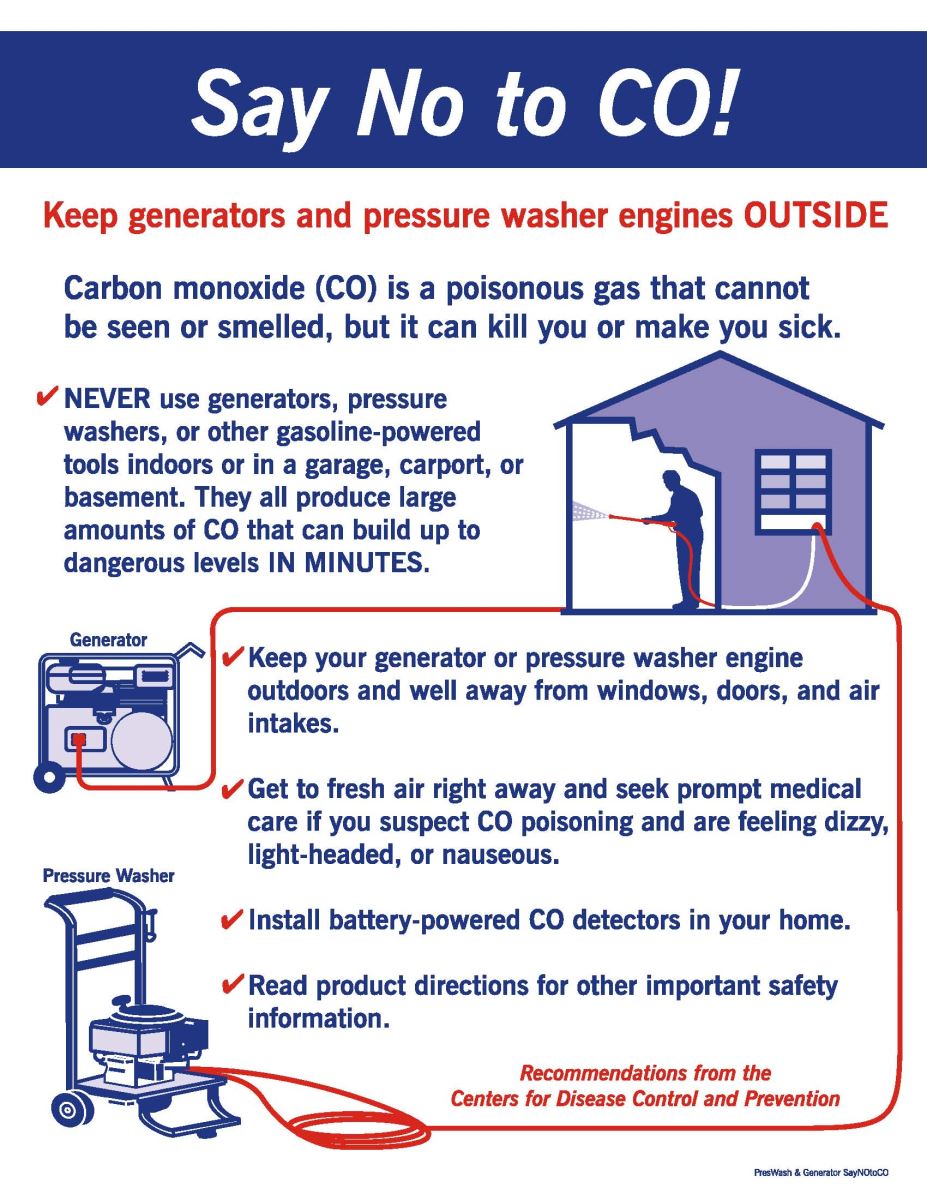
Sources of Carbon Monoxide
Carbon monoxide is the by-product of the incomplete combustion of any fuel source, whether natural gas, wood, charcoal, oil, kerosene, propane, or gasoline. It can be produced by a wide array of common appliances, including furnaces and water heaters, clothes dryers, space heaters, ranges and ovens, as well as by fireplaces, wood stoves, charcoal grills, and garaged automobiles.
To prevent CO poisoning, it is crucial that appliances and other combustion sources are properly maintained and adjusted.
Proper venting of appliances is also important. Appliances like gas dryers and non-electric space heaters should be vented to the outside. Regular inspections of vents, flue pipes, chimneys, filters, and venting systems for all appliances, furnaces, and gas water heaters should be conducted, checking for blockages, corrosion, cracks, or other damage.
Steps to Reduce Exposure to Carbon Monoxide
- Make sure appliances are installed according to manufacturer's instructions and local building codes. Most appliances should be installed by professionals. Have heating systems (including chimneys and vents) inspected and serviced annually. The inspector should also check chimneys and flues for blockages, corrosion, and loose connections.
- Never burn charcoal inside a home, garage, vehicle, or tent.
- Never use portable fuel-burning camping equipment inside a home, garage, vehicle, or tent.
- Never leave a car running in an attached garage, even with the garage door open.
- Never service fuel-burning appliances without proper knowledge, skills, and tools. Always refer to the owner's manual when performing minor adjustments or servicing fuel-burning appliances.
- Never use gas appliances such as ranges, ovens, or clothes dryers for heating your home.
- Never operate unvented fuel-burning appliances in any room with closed doors or windows or in any room where people are sleeping.
- Do not use gasoline-powered tools and engines indoors.
Carbon Monoxide Detectors/Alarms
CO detectors/alarms can help prevent exposure to unhealthy CO concentrations, but are not a substitute for proper use and upkeep of appliances and other potential sources of CO.
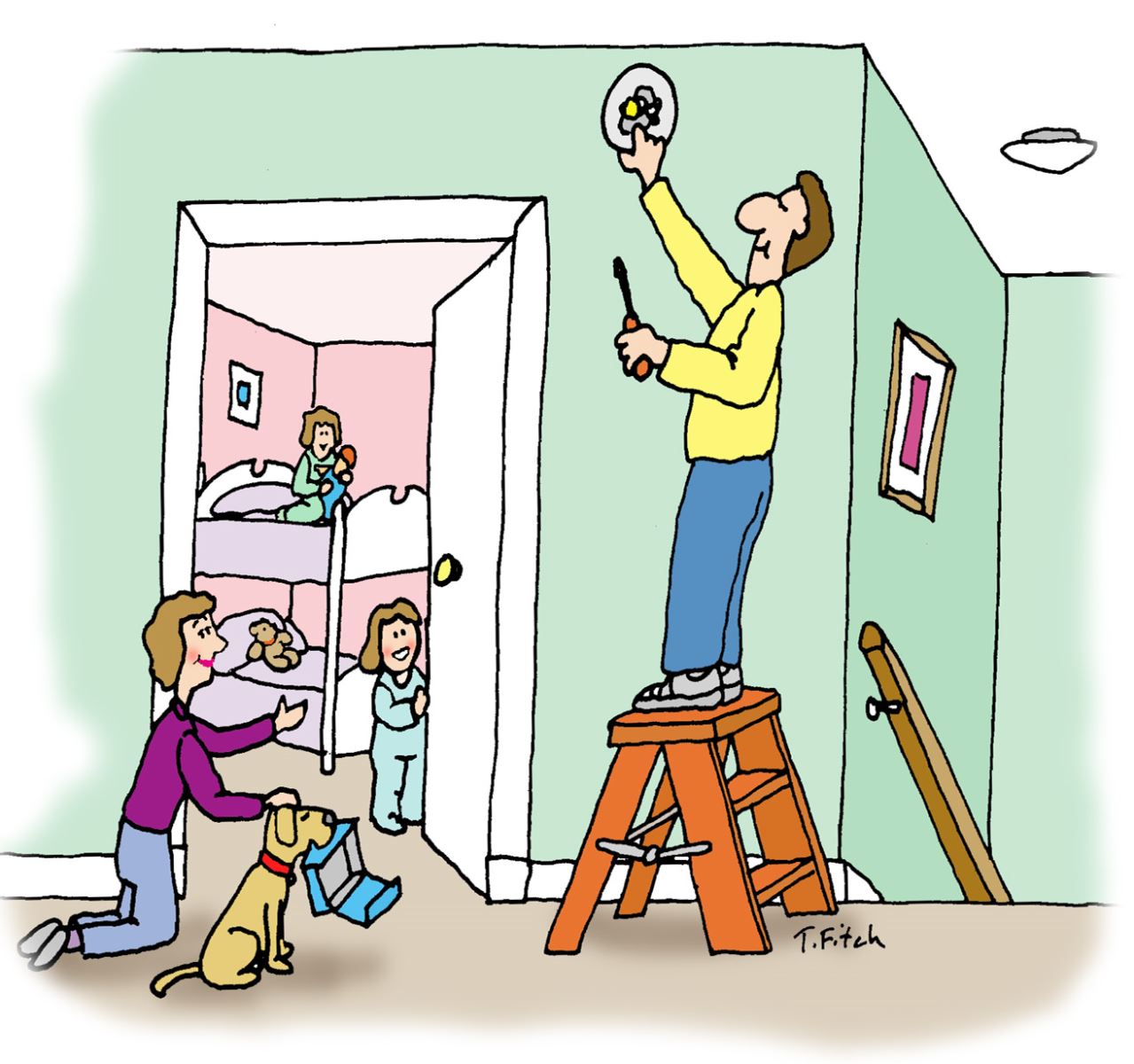
The U.S. Consumer Product Safety Commission (CPSC) recommends the installation of CO detectors/alarms that meet the requirements of the current UL 2034 standard . The CPSC recommends installation of a detector in the hallway near every separate sleeping area of the home. The detector should have a battery back-up power supply, and the batteries should be checked regularly. In addition, the detector should display current CO levels.
UL 2034 states that “alarms covered by this standard are not intended to alarm when exposed to long-term, low-level carbon monoxide exposures or slightly higher short-term transient carbon monoxide exposures, possibly caused by air pollution and/or properly installed/maintained fuel-fired appliances and fireplaces.” As a result, some building science experts suggest it may be appropriate to install a low-level CO detector alarm, particularly if those susceptible to CO (including infants, pregnant women, or individuals with heart problems) live in the home.
Useful links
Lead
Lead is a naturally occurring element found in small amounts in the earth’s crust. While it has some beneficial uses, it can be toxic to humans and animals.
Lead is particularly dangerous to children because their growing bodies absorb more lead than adults, and their brains and nervous systems are more sensitive to the damaging effects of lead. Most childhood exposure occurs through children's normal hand-to-mouth activity after contact with a source of leaded dust. The most effective prevention of childhood lead poisoning is to reduce or eliminate exposure.
Sources of Lead
Lead was once used in a wide variety of products found in and around our homes, including paint, ceramics, pipes and plumbing materials, solders, gasoline, batteries, ammunition, and cosmetics. However, Federal and state regulatory standards have helped to minimize or eliminate the amount of lead in air, drinking water, soil, consumer products, food, and occupational settings.
Despite the strict standards, lead remains a significant and widespread environmental hazard for children in Maryland. According to the Maryland Department of the Environment (MDE), the major source of exposure for children is lead paint dust from deteriorated lead paint or from home renovation.
Steps to Reduce Exposure to Lead
Following proper lead abatement procedures is critical if you are undertaking renovations or repairs of a home where lead may be present. The U.S. Environmental Protection Agency (EPA) provides an excellent guide for addressing lead for contractors, homeowners hiring contractors, or do-it-yourselfers. The guide provides information on determining if lead paint is present, protecting workers and home occupants from exposure to lead during the work, cleaning up the work site after the work is done, and disposing of lead contaminated waste.
Lead Regulations
The requirements for managing lead vary depending on whether the property is an owner occupied property or a rental property.
In general, repair and remodeling activities in owner occupied housing units are not subject to specific regulations related to the management of lead. Contractors and homeowners engaged in repair or remodeling activities should follow the EPA guide for proper lead management during repair and remodeling activities that may result in disturbance to paint and other materials containing lead.
In addition, Section 3-7 of the Montgomery County Code related to Air Quality contains provisions for the control of dust from construction activities to minimize the potential for the release of lead dust from a property being renovated or demolished.
The Maryland Department of the Environment's (MDE) Lead Poisoning Prevention Program enforces state laws related to lead in rental properties. Under the 1994 "Reduction of Lead Risk in Housing Law," MDE:
- Assures compliance with mandatory requirements for lead risk reduction in rental units built before 1950;
- Maintains a statewide listing of registered and inspected rental units;
- Certifies and enforces performance standards for inspectors and contractors working in lead hazard reduction;
- Performs environmental investigations for lead poisoned children; and
- Provides oversight for community education to parents, tenants, rental property owners, homeowners, and health care providers to enhance their role in lead poisoning prevention.
Useful links
- Maryland Department of the Environment (MDE) - Environmental Protection Agency
- Lead Poisoning Prevention Program
Finding an Indoor Air Quality Professional
In some cases, identifying and resolving an indoor air quality issue may require the services of an indoor air quality professional. These individuals and the companies that employ them have the necessary training, experience, and equipment to address a variety of indoor air quality concerns.
There are two principal categories of indoor air quality professionals:
- Consultants diagnose and develop remediation plans for indoor air quality problems. Included in this category are industrial hygienists, indoor air quality specialists, asbestos and lead inspectors, and radon specialists.
- Professionals perform the actual remediation services to address indoor air quality problems. Many firms provide both diagnostic and remediation services.
Air Quality Certifications
Several non-profit organizations certify indoor air quality professionals. Although DEP cannot recommend the services of any particular individual or company, choosing a professional who has received the proper training and certification should help ensure you receive quality services. When selecting an indoor air quality professional, it is important to compare the services (and prices) of different professionals, check references, etc. just as you would for any other product or service.
Each of the organizations listed below has an on-line search feature that allows you to find professionals that provide the appropriate services in Montgomery County.
- American Council for Accredited Certification (ACAC) – Professionals certified in air quality programs accredited by the Council of Engineering and Scientific Specialty Boards.
- American Industrial Hygiene Association (AIHA) – Professionals certified by the AIHA in a range of air quality specialties.
- Indoor Air Quality Association (IAQA) – Professionals that have received training from the IAQA and are certified by the American Council for Accredited Certification (ACAC).
- Maryland Department of the Environment (MDE) – List of air quality consultants and industrial hygiene firms maintained by MDE